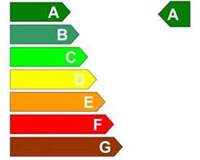Laura Jones explains why increased availability of energy performance data could be bad news for commercial property owners
The UK government’s statutory commitment to reducing the country’s carbon emissions over the next 15 years, to meet a target of a reduction of 80% from their level in 1990, is an impending reality facing the property industry. With as much as 50% of the UK’s carbon emissions being attributable to the construction and operation of buildings, it is not surprising that energy issues are becoming nigh unavoidable in the property sphere. New plans to publish more detailed technical data on the energy performance of non-domestic properties should focus owners’ minds on an increasingly pressing problem.
EPCs and recommendation reports
Professionals involved in transactional property will be familiar with energy performance certificates, known as EPCs, along with the “recommendation reports” which accompany them.
The aim of EPCs is to distinguish good from poor energy performance using a grading system, understood in conjunction with a recommendation report identifying measures that could improve energy efficiency. The information is designed to ensure that prospective owners or occupiers are equipped with a better understanding of the running costs of a property, and are encouraged to prioritise energy efficiency, while also incentivising developers to focus on sustainable building practices.
EPCs and recommendation reports are publicly available, and can be obtained via a central online register. This is not a recent development; it is widely known that a property cannot be marketed without an EPC, and the publication of EPCs and recommendation reports is key to achieving the government’s underlying aims by ensuring that businesses are held accountable for their decisions relating to sustainability.
Environmental performance data
On 5 January 2015 the Department for Communities and Local Government (“DCLG”) announced its intention to go one step further in publishing some 723,000 records comprised of data from non-domestic EPCs. The information, which relates to the technical data on which EPCs and recommendation reports are based, will be available imminently on the DCLG’s Open Data website.
The DCLG’s decision was made following a request for disclosure made under the Environmental Information Regulations 2004, and, in a statement accompanying the announcement, the department emphasised that it “appreciates the value of information about energy performance of buildings to researchers, local authorities and environmental organisations and believes it is in the public interest to make this information available”.
Friend or foe?
A number of commentators have expressed alarm at the potential consequences of such disclosure. The data to be published by DCLG is expected to be specialised in nature, and not easily interpreted by the vast majority of the public. However, it is anticipated that the information will be made available in a format more easily manipulated to facilitate analysis than any data currently available.
It is feared that information could be used to the detriment of owners and occupiers of commercial property in a number of ways. Environmental organisations could create league tables, enabling prospective buyers or tenants to draw comparisons in terms of energy performance. Where a business promoted as having a green ethos is associated with premises having a low energy efficiency rating, it could be scrutinised by the general public. This possibility could subsequently lead to the boycotting of inefficient premises, particularly as businesses are increasingly keen to portray themselves as environmentally friendly.
In addition, while the data will be accompanied by copyright warnings, expressly prohibiting the re-use of addresses for commercial purposes, this may not be sufficient to prevent opportunists mining the information for marketing purposes. Owners or occupiers of inefficient premises may find themselves the target of unsolicited approaches from contractors looking to capitalise on any apparent inefficiency.
The publication may pose a more serious immediate threat to businesses where security is a key consideration, for example banks and government buildings. The information could potentially provide unsavoury characters with detailed information about the materials or layout of high-security buildings.
In summary, it is clear that this enhanced transparency could pose reputational risks, along with having potential investment implications, and therefore concerns about increased exposure may be justified. In the alternative, publication may only serve to benefit the owners of properties with high energy efficiency performance.
In any event, owners of low-rated properties should bear in mind that the government is set to introduce the Minimum Energy Efficiency Standards on a staggered basis between 2018 and 2023, rendering underperforming properties unlettable, and therefore any financial implications relating to energy performance are likely to be unavoidable.
Opting out
The DCLG recognises the issues facing certain holders of non-domestic EPCs, and has given them an opportunity to opt out of disclosure, although this option has not been widely publicised.
DCLG initially cited a deadline of 16 January 2015 for opting out, however going forward this will still be possible for both existing EPCs, and those commissioned in the future. EPC holders can opt out online using their report reference number (RRN) and confirming the decision by clicking on the link sent to their e-mail address.
Unfortunately, for opt-out requests made after the 16 January deadline, the government cannot guarantee that the information will not appear in the first release of information, due imminently. In addition, owners of commercial property wanting to prevent publication may also face difficulty where they do not know their RRN, or are not aware of the existence of an EPC, for example, where it has been commissioned by a tenant. In future, landlords should ensure that their leases include provision requiring tenants to provide them with the information necessary to opt out as a minimum where EPCs are being commissioned.
- EPCs and recommendation reports can be obtained via the central register at www.epcregister.com
- The DCLG’s Open Data website is at www.opendatacommunities.org
- EPC holders can opt-out at www.epcregister.com/opt-out
Laura Jones is a solicitor at Cripps








